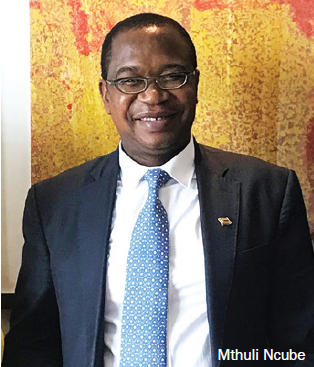|
||||||||||
| Home Nation World Business Opinion Lifestyle ChinAfrica Multimedia Columnists Documents Special Reports |
|
||||||||||
| Home Nation World Business Opinion Lifestyle ChinAfrica Multimedia Columnists Documents Special Reports |
| ChinAfrica |
| Sound Investment |
| Zimbabwe seeks new business opportunities at CAETE |
| | VOL.11 July ·2019-06-27 |

China-Zimbabwe Friendship Hospital built under a Chinese aid project in Mahusekwa, Zimbabwe (ZHANG YULIANG)
The First China-Africa Economic and Trade Expo, to be held in Changsha, capital city of central China’s Hunan Province, from June 27-29, is set to provide a bonanza of business opportunities. The expo is an important economic and trade cooperation platform under the framework of the Forum on China-Africa Cooperation (FOCAC). ChinAfrica had an interview with Mthuli Ncube, Zimbabwean Minister of Finance and Economic Development, before the expo. The minister shared his view of this event and the prospects of China-Zimbabwe economic ties. An edited version of his views follows:
ChinAfrica: China will hold the First China-Africa Economic and Trade Expo. What are your expectations of the expo and Sino-Zimbabwean investment in general?
Mthuli Ncube: We really are looking forward to the expo. We will have a full representation at the expo. First of all, we have a government delegation from foreign affairs, agriculture and other areas. In addition, we have visitors from Zimbabwe’s business community who are looking for opportunities here [in China]; also, there will be Chinese businesspeople who are looking for opportunities in Africa. So I expect full participation from Zimbabwe and from the rest of Africa.
It’s a great opportunity. The expo is part of a process for promoting investment and trade into Africa and vice versa into China. So clearly, it is much needed. In terms of investment, there is so much opportunity in Africa for Chinese investors to explore and they have been doing that. When we look at the market, Zimbabwe’s mining industry, for example, has full participation by Chinese investors in the iron ore sector and we expect other sectors to also benefit. If you think of a sector like tourism, we have seen an increase in the number of tourists from China. We expect maximum benefit for Zimbabwe and the rest of Africa, but also vice versa. I must say we’d like to see more African goods being exported to China and also, we’d like to see some beneficiated goods being exported to China, not just raw materials.

Mthuli Ncube (LI KAIZHI)
What are your plans to improve the Zimbabwean economy and what role is being played by the Chinese cooperation with Zimbabwe?
In terms of the economy, we have a Vision 2030, which seeks to move Zimbabwe to upper-middle income status by the end of 2030. In the interim, we have the transitional stabilization program where we seek to stabilize and reform the economy.
So far, the road we have traveled has involved fiscal stabilization and I’m pleased that we have made progress on that. We are also making progress in reforming the monetary system and we now have a domestic unit of account in terms of currency in the form of the RTGS (real-time gross settlement) dollar. We will stabilize it, but of course we are aware that inflation is high and that it would remain high to about year end. This time next year, it [inflation] will be low because we are starting from a low base. In the interim, we will provide social protection to those who are vulnerable. We have done so recently with the lowering of bus fares for those who are using ZUPCO (Zimbabwe United Passenger Co.) and we also implemented other social protection measures, such as cash transfers and food for the vulnerable in the rural areas. This year, we are doing something new, that is, giving food to vulnerable people in the urban areas, something that we have never done as a government. We are aware of our responsibilities as regards social protection.
Moving on, we have made progress in reforming state-owned enterprises, such as re-bundling Zimbabwe Electricity Supply Authority into single entities and unbundling the grain marketing board into strategic granary and commercial silo industries. Silo industries will do a lot in stabilizing prices by getting into the food processing sector. In addition, we are reforming the Zimbabwe Cold Storage Commission, Allied Timbers and the banking sector. The latter is being reformed in terms of the companies that the government controls, so we have a full state-owned enterprise which will again engender the private sector-led economy that the president has spoken about on many occasions.
In terms of institutional reforms, we are improving the environment for doing business and now foreign investors can own more than 51 percent of any company in Zimbabwe, except in the diamond sector.
So, in terms of reforming the economy, that is our intention through the Transitional Stabilization Program which ends in 2020. We then move on to put in place a five-year strategy followed by a second five-year strategy that will see us through to 2030. That is the strategy for reforming the economy.
Now, regarding the role of China in this, China is a strong partner for Zimbabwe in terms of providing us with a market, capital and other forms of support. In terms of market, we want to be able to export to China without too many impediments. I can envisage here that some of our processed iron ore will find its way to China. I’d like to see us develop a strong export market for soya beans, for example, with China, because China is a big consumer of tofu. We already have a strong relationship with China in the tobacco sector. We would like to export more tobacco and also to increase our out-grower scheme that’s already in place through China’s Tianze Tobacco Co. Ltd., which is a big buyer of tobacco.
We want to expand and see these areas grow. As far as investment, we want to see more investment in infrastructure. China is a world leader in building infrastructure. We want them to invest so we can learn from them.
What economic incentives has your ministry put in place to attract Chinese investors to Zimbabwe?
Our incentives are really for all investors. First of all, we are improving the environment for doing business. To help with this, we have set up the Zimbabwe Investment Development Agency (ZIDA). The bill for ZIDA is now going through parliament and will soon be approved.
ZIDA will allow foreign investors to come into Zimbabwe and have the least difficulty in establishing themselves and get all the information from a one-stop shop.
Second, we want to cut down the time taken to register a company and get a license [to operate] down to a minimum. Third, any investor, local or international, can apply what we call National Project Status that will immediately accord them various incentives in terms of tax.
I’m aware that some Chinese investors and also some investors from South Africa and the UK are already benefiting from these tax incentives. In addition, under our arrangement with the Export-Import Bank of China, the bank is giving some financial support to companies in China who are investing in Zimbabwe. Some tax incentives are already built-in in terms of our arrangement. So, there is a lot regarding the bouquet of incentives that we have and investors can take their money out [of the country], but we will [have to] solve the currency challenges that we have.
(Comments to niyanshuo@chinafrica.cn)

(Scan the QR code to view the video)
| About Us | Contact Us | Advertise with Us | Subscribe |
| Copyright Beijing Review All rights reserved 京ICP备08005356号-5 京公网安备110102005860号 |